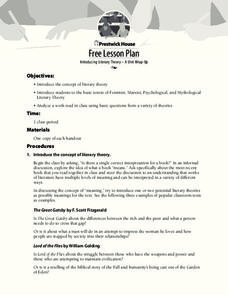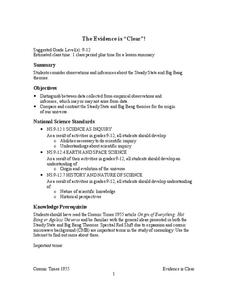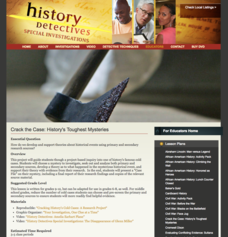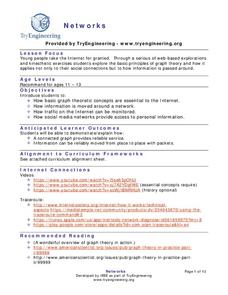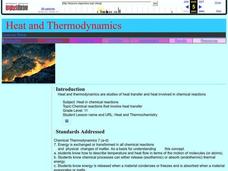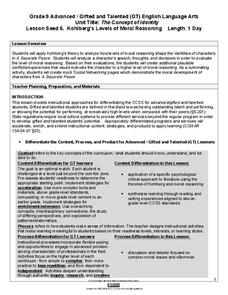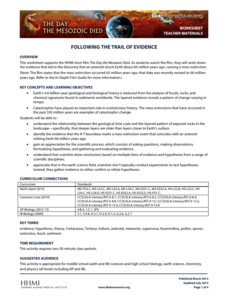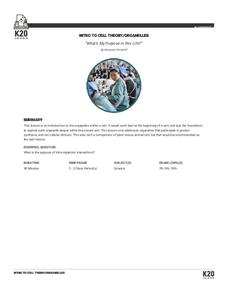Prestwick House
Introducing Literary Theory – A Unit Wrap-Up
Literary theories are lenses through which a text may be analyzed. The question in this lesson plan is how a particular literary lens can influence the reader's view of the text.
NASA
Two Versions of Gravity: Newton and Einstein
We have all heard the debate about teaching both theories, but an innovative lesson plan takes the discussion to a new level. Scholars research and debate Newton's Law of Gravitation versus Einstein's General Theory of Relativity with...
Howard Hughes Medical Institute
The Making of a Theory—Fact or Fiction
Two scientists, two independent studies, two similar theories! A video lesson presents the work of Charles Darwin and Alfred Wallace that led to their theories on evolution. Scholars then evaluate statements and provide evidence to...
Teach Engineering
Earthquakes Living Lab: The Theory of Plate Tectonics
Find out if your class agrees with Ice Age: Continental Drift ... or if it's just a fun family movie! Class members research the theory of continental drift, examine evidence of plate tectonics, connect this information to engineering,...
NASA
The Evidence is “Clear”!
Do you think you know better? Become a scientist and prove it. Scholars review the evidence for two different theories of the origins of the universe. They notice the empirical observations as well as the inferences to determine which is...
Columbus City Schools
Let’s Get Theoretical About Cells
Get up close and personal with cells in a hands-on journey to discover what makes up living things. Scholars learn valuable microscope skills, delve into the Modern Cell Theory, and gain insight into how cells reproduce. The included lab...
Curated OER
Lesson: Nikhil Chopra: Performing Memory
Film imitates life; that's what they say. Using performance theory to tie the lesson plan together, learners attempt to understand memory and daily rituals as seen in art, film, and life. They read two chapters from the book, watch the...
Exploratorium
Traveling Networks
Show your class the path to understanding graph theory. Scholars learn about basic graph theory using an activity based on the Bridges of Konigberg problem. They draw networks on the playground and decide whether it is possible to travel...
PBS
Crack the Case: History's Toughest Mysteries
Young sleuths don their trench coats, tip their fedoras, and grab their notepads to investigate one of four famous unsolved mysteries. After examining multiple primary and secondary sources related to their cold case, they propose a...
TryEngineering
Networks
Ever wonder how the Internet works? The lesson teaches scholars the basics of graph theory and how it applies to the Internet. They perform simulations to see how information is sent on the Internet.
Curated OER
Understanding the Cosmic Microwave Background (CMB)
How did our universe really begin? Explore the Science Big Bang Theory and Cosmic Microwave Background (CMB) with this multiple activity-based lesson that demonstrates that the increase of density due to the decrease of temperatures,...
Carolina K-12
Learning About the Federal Budget: “Get a Pencil, You’re Tackling the Deficit!”
Your class members have been selected by the president to help solve the budget crisis as part of a special deficit commission. After learning about fiscal policy, economic theories, and the federal budget through a detailed PowerPoint...
Curated OER
Density Studies of the Earth
Density comes to life as investigators place soda cans into containers of various liquids to find if they sink or float. They layer different density liquids, compare densities of different gases, and more. A total of six different...
Curated OER
Gas Pressure, Volume, and Temperature
Physical science learners conduct a simple experiment using the heat of their hands to affect the fluid pressure. They place a balloon atop a freezing cold bottle and observe what occurs as it warms up. Both activities demonstrate how...
Curated OER
Heat and Thermodynamics
This is actually a 10-day mini unit on thermal energy for your high school chemists. Every avenue is taken to get learners absorbed in heat: a pretest, a PowerPoint presentation, Internet exploration, demonstrations, lab activities, and...
Maryland Department of Education
The Concept of Identity Lesson 6: Kohlberg's Levels of Moral Reasoning
How does our moral reasoning shape our identity? After a study of Kohlberg's Levels of Moral Reasoning, readers use Kohlberg's theories to analyze the speech, thoughts, and decisions of a character in A Separate Peace. They then create...
Maryland Department of Education
The Concept of Identity Lesson 4: The Psychological Approach
Readers apply Sigmund Freud's theories of the unconscious mind and the psychological approach to literary criticism to analyze and evaluate the relationship between two characters in A Separate Peace.
Harvard University
Cosmic Questions
Scholars learn the stories of the universe with a unit study on the cosmos. They model the universe, learn about the relationship with the electromagnetic spectrum, understand the big bang theory, and debate the existence of life on...
Howard Hughes Medical Institute
Following the Trail of Evidence
One important skill in analyzing scientific evidence is identifying facts versus opinions. Scholars identify pieces of evidence from the film The Day the Mesozoic Died and then discuss this evidence in small groups at the end of each act...
Columbus City Schools
Cell-abrate!
Lights, camera, action! With the cell at center stage, guide your seventh grade biologists through the tiny drama that plays out within every living thing. Then, enjoy the show as they portray the organelles they've studied—a performance...
American Institute of Physics
Dr. Gates and the Nature of the Universe
What do Russian nesting dolls have to do with physics? They make a great demonstration tool for explaining Dr. Sylvester James Gates, Jr.'s string theory to young scientists. A two-part lesson first introduces learners to Dr. Gates' life...
It's About Time
The Doppler Effect
In 1842, Christian Doppler proposed a theory relating the change of wavelengths based on motion. Young scholars observe the Doppler Effect on a small scale in a ball, on a larger scale from a car, and on the largest scale studying the...
K20 LEARN
What's My Purpose In This Life? Intro To Cell Theory/Organelles
Why are we here? Well, if you happen to be a Golgi body, the answer is simple! Young biologists embark upon a journey through the tiny world of cellular organelles with an engaging lesson from the K20 Center. The activities open with an...
Science 4 Inquiry
Expanding the Universe
When Einstein first heard the theory of the expanding universe, he dismissed it as bad physics. Now scholars learn about the theory and how scientists prove it has merit. Through a hands-on simulation and videos, class members measure...
Other popular searches
- Number Theory
- Music Theory
- Atomic Theory
- Cell Theory
- Big Bang Theory
- Color Theory
- Economic Theory
- Music Theory Lesson Plans
- Theory of Evolution
- Germ Theory
- Continental Drift Theory
- Cell Theory Scientists


